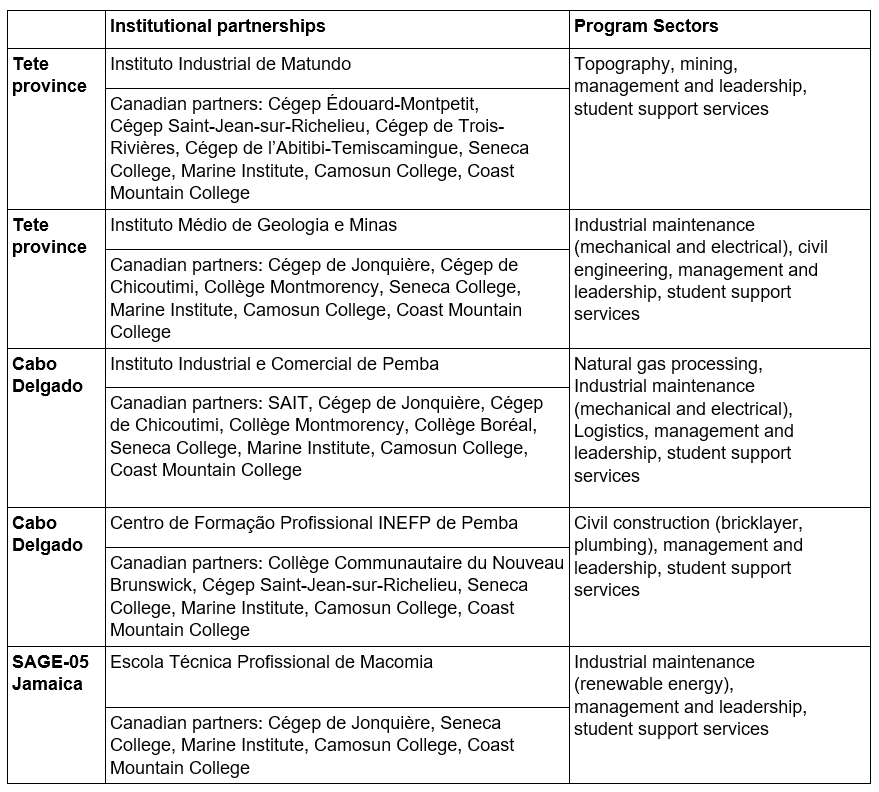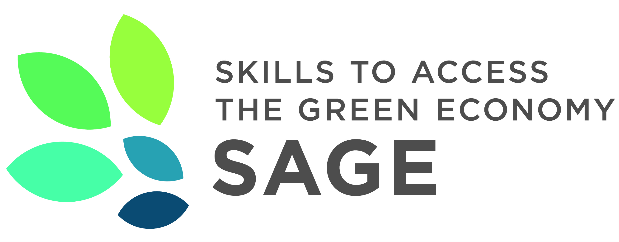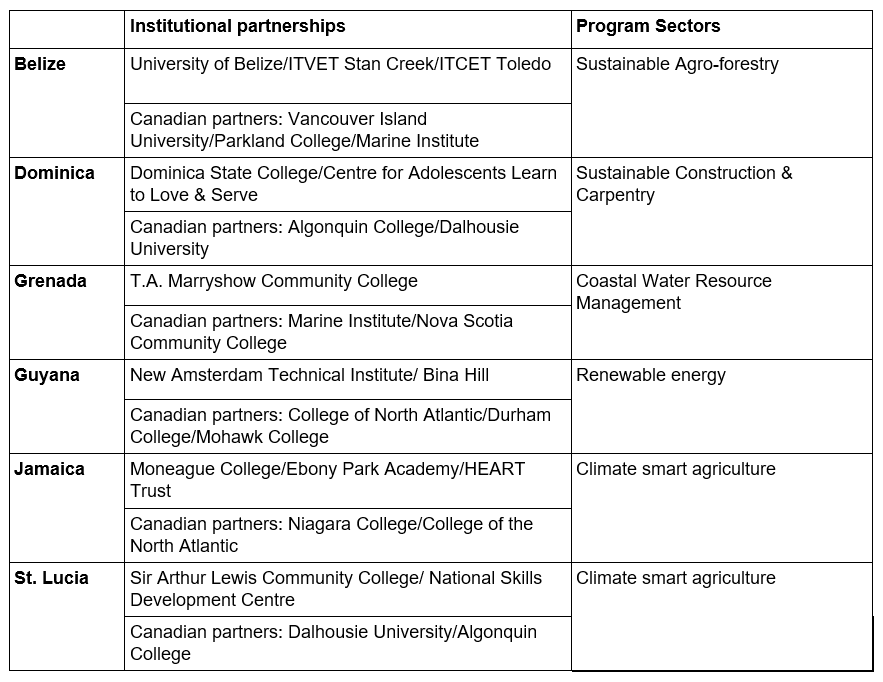7
The International category encompasses how our member institutions international partnerships help advance the SDGs.
 ” width=”755″ height=”167″>
” width=”755″ height=”167″>
CICan and Canadian colleges support Mozambican training institutions to prepare girls for success
Project: Skills Training for Employment in Mozambique (STEM)
SDG: 5 Achieve gender equality and empower all women and girls
Project duration: 2014–2021
Functional Category: International development and cooperation
The Skills Training for Employment Program in Mozambique (STEM) is enhancing the quality and delivery of demand-driven, competency-based, gender-sensitive training programs in Tete and Cabo Delgado provinces. In partnership with the Government of Mozambique, Colleges and Institutes Canada (CICan) and its member colleges are providing technical assistance in gender-sensitive teacher training and management training, procurement of industrial training equipment, and development of new and renewed training programs. The STEM project has also supported the establishment of student support services, an innovative approach in Mozambique to support the well-being students, particularly girls and women, during their training at partner institutions.
STEM has contributed to SDG 5 in Mozambique by increasing girls’ and women’s’ participation in training programs and changing attitudes about their participation in professional and technological streams. STEM’s Supertécnica outreach campaign has stimulated discussions among students, trainers, institutional leaders, and parents on themes such as early marriage, family planning, sexually transmitted diseases, and gender-based violence, among other themes.
In the training institutions in Tete and Cabo Delgado, STEM has supported girls and women through activities in three categories: recruitment, retention, and insertion into the labour market. For recruitment, STEM has worked with the gender equality resources at the Mozambican training institutions to develop a storyline entitled “Julia e Felicidade – o caminho para o futuro”, which contrasts the life of Julia (who follows a traditional life path) with that of Felicidade (whose family invests in her education) to challenge gender stereotypes. The “Julia e Felicidade” storyline was illustrated and developed into a booklet for distribution to parents and young people in surrounding communities. Student theatre groups also developed “Julia e Felicidade” performances that focus on the Supertécnica themes. Coast Mountain College worked with the gender equality teams at the training institutions to disseminate the booklets and the messages.
On retention, Supertécnica has contributed to a culture of zero-tolerance behaviour towards sexual assault, which primarily affects girls, and pay-for-grades corruption, which affects girls and boys. Directors, trainers, and students have been sensitized on anti-sexual harassment and pay-for-grades corruption through workshops and training activities, and STEM successfully advocated for the development of a ministerial decree defining a sector-wide grievance mechanism for victims of sexual harassment in schools.
Canadian colleges – Cégep Édouard-Montpetit, Cégep Saint-Jean-sur-Richelieu, Cégep de Trois-Rivières, Cégep de l’Abitibi-Temiscamingue, Seneca College, Marine Institute, Camosun College, Coast Mountain College, Cégep de Jonquière, Cégep de Chicoutimi, Collège Montmorency, SAIT, Collège Boréal, and Collège Communautaire du Nouveau Brunswick –have worked with their Mozambican institutional partners to integrate gender equality into the content of curriculum and the pedagogical approach of the training programs.
For insertion into the labour market, Canadian colleges have supported their Mozambican partners to create linkages with local employers, and identify apprenticeship and employment opportunities for the students, particularly for girls and women graduates of STEM programs.
Stakeholders Involved:
 ” width=”567″ height=”511″>
” width=”567″ height=”511″>
Project Lead: Marie-Josée Fortin, Director, Latin America, and Francophone and Lusophone Africa; mjfortin@collegesinstitutes.ca
Canadian Colleges Supporting Six Caribbean Countries Combat Climate Change
 ” width=”356″ height=”139″>
” width=”356″ height=”139″>
Project: Skills to Access the Green Economy Program (SAGE)
SDG: 13 Take urgent action to combat climate change and its impacts
Project duration: 2019–2024
Functional Category: International development and cooperation
The Skills to Access the Green Economy Program (SAGE) is a five-year program funded by Global Affairs Canada. In SAGE, Colleges and Institutes Canada (CICan) is working in close collaboration with national Ministries of Education, National Training Agencies (NTAs), and relevant employers to build the capacity of Caribbean technical and vocational training institutions to develop and deliver effective skills training programs resulting in 1,080 graduates ready to have jobs or self-employment in green skills sectors. SAGE’s ultimate outcome is to create a more qualified labor force for employment in key economic sectors associated with climate change in six Caribbean countries (Belize, Dominica, Grenada, Guyana, Jamaica, St. Lucia).
The majority of SAGE activities will be delivered primarily through six partnerships between CICan member institutions and Caribbean training institutions. In each participating country, institutions that deliver training programs for unattached youth, women, vulnerable persons, and indigenous peoples will be linked with tertiary level institutions and together they will select the Canadian partners with whom they will collaborate over a period of three years. The institutional partnerships will develop and deliver preparatory programs that include psychosocial supports, skills training, career counselling, and exposure to the workplace. Graduates will receive certifications for this training, with the goal of ensuring that they can move into either employment or further training.
The partnerships will also develop associate degree level programs to prepare technical workers and draw content from these programs to develop and deliver short courses targeted to persons currently working but who would benefit from enhanced skills sets to work with new green technologies or processes. Through focused applied research projects designed to solve challenges small and medium enterprises face as they adapt to climate change in coastal and agricultural environments, the linkages between training institutions and workplaces will be further strengthened.
Stakeholders Involved:
 ” width=”562″ height=”434″>
” width=”562″ height=”434″>
Project Lead: Susan Sproule, Director, Caribbean and Anglophone Africa; ssproule@collegesinstitutes.ca

